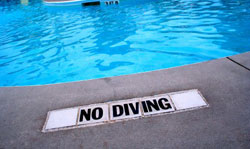What is the Duty if Hazard is Readily Apparent?
 The Illinois state legislature is hearing debate on a bill that would provide more protection to persons injured on the property of others. In Illinois, as in other states, a landowner generally has a duty to maintain residential or commercial premises so as to minimize the risk of injury to anyone legally on the property. The Illinois statute mandates “reasonable care” on the part of landowners, but a 2003 court case held that conditions that are “open and obvious” do not fall under this duty. The proposed law is an effort to change that.
The Illinois state legislature is hearing debate on a bill that would provide more protection to persons injured on the property of others. In Illinois, as in other states, a landowner generally has a duty to maintain residential or commercial premises so as to minimize the risk of injury to anyone legally on the property. The Illinois statute mandates “reasonable care” on the part of landowners, but a 2003 court case held that conditions that are “open and obvious” do not fall under this duty. The proposed law is an effort to change that.
As the law is currently interpreted in Illinois, a judge or jury can decide that no duty was owed by a landowner if the condition causing injury was “open and obvious.” The statute, if enacted, would limit the application of the “open and obvious” exclusion to a determination of the degree of comparative fault. In other words, the landowner would still owe the duty, but the extent to which the landowner would be liable could be reduced by the degree to which the hazard was “open and obvious.”
The “open and obvious” defense has long been recognized in New Jersey, but has often been ignored or disregarded by the courts. In 2009, however, in the New Jersey Superior Court, Appellate Division, the court heard and ruled on the validity of the defense in a case involving the owner of a single family home.
In Donohue v. Polozzo, the injured party fell down the stairs to the basement of a house and sought damages, arguing that the absence of a handrail was the cause of the fall. The homeowner argued at trial that the absence of the handrail was obvious, and that the injured party (who had lived at the residence for 10 months) knew about the condition. Therefore, it was open and obvious, and no duty was owed. The trial court agreed, and the decision was affirmed on appeal.
Contact Taylor & Boguski
At Taylor & Boguski, we bring more than 70 years of combined legal experience to injured people throughout New Jersey. For a free initial consultation, contact our office online or call us at 856-200-8989.

